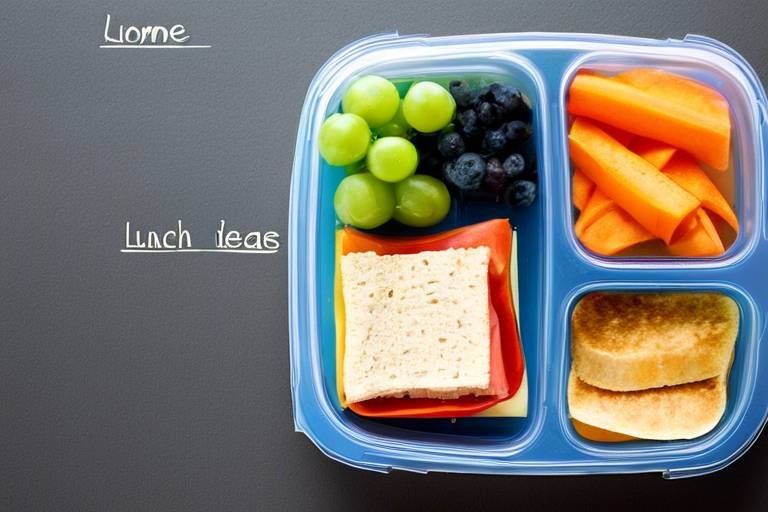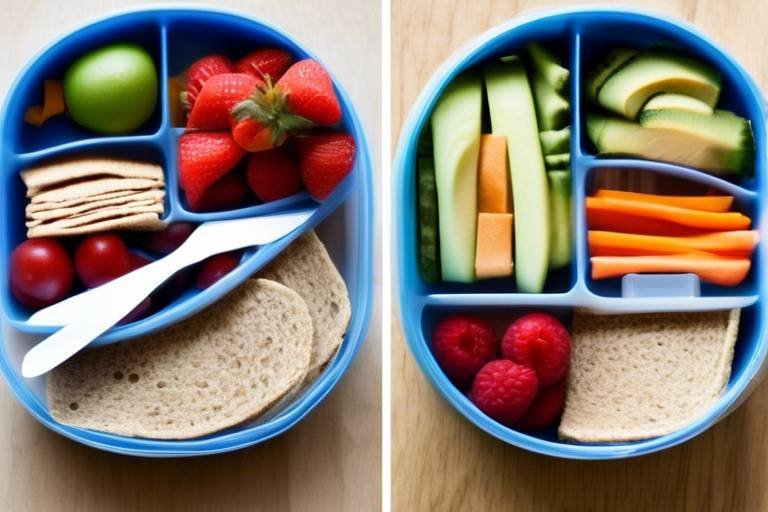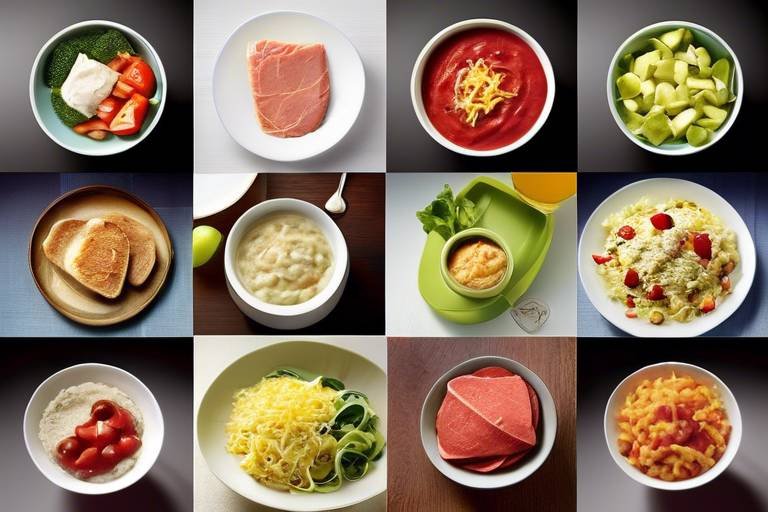The Nutritional Benefits of Family Meals
Exploring the various ways family meals contribute to better health, emotional well-being, and social connections, this article highlights the importance of shared dining experiences for families of all shapes and sizes.
Family meals often lead to healthier food choices, as parents can control ingredients and portion sizes. This not only promotes balanced diets but also encourages children to try new foods and develop better eating habits. When families gather around the table, it becomes easier to incorporate a variety of food groups, ensuring that everyone gets the nutrients they need. Think of it as a delicious way to sneak in those vital vitamins and minerals!
Moreover, studies show that children who regularly eat with their families tend to consume more fruits and vegetables while reducing their intake of unhealthy snacks. It's like a superpower for their health! Parents can introduce new dishes, making mealtime an exciting adventure rather than a chore. By engaging children in meal planning and preparation, families can instill a sense of ownership over their food choices, leading to lifelong healthy habits.
Sharing meals fosters communication and strengthens relationships among family members, providing a supportive environment where individuals can express feelings and share experiences. This is crucial for enhancing emotional well-being. When families sit down together, they create a safe space for open dialogue, laughter, and even the occasional debate! It's during these moments that we learn to listen, empathize, and connect with one another on a deeper level.
Establishing family meal traditions creates lasting memories and instills a sense of belonging. Whether it's Taco Tuesday or Sunday brunch, these rituals contribute to a family’s identity and reinforce the importance of togetherness. They serve as a reminder that, no matter how busy life gets, there’s always time to reconnect over a meal.
Family meals can serve as a platform for celebrating milestones, fostering unity and pride within the family unit. Birthdays, graduations, or even just a good report card can be celebrated with a special dinner. These gatherings create cherished memories for all, reminding us that every achievement, big or small, deserves recognition.
Consistent mealtime rituals create a sense of stability and predictability, which can be particularly beneficial for children. They help children feel secure and grounded, providing a comforting routine in an often chaotic world. Imagine how much easier it is for kids to navigate their day when they know they can count on family dinner time as a constant!
Family meals provide an opportunity for open dialogue about various topics, including health, education, and social issues. This promotes critical thinking and emotional intelligence among family members. By discussing current events or personal experiences over dinner, families can cultivate an atmosphere of learning and understanding. It's like a mini classroom where everyone gets to share their thoughts and perspectives.
Regular family meals have been linked to improved academic performance and better social skills in children. As they learn to communicate and engage with others in a nurturing environment, they develop essential life skills that will serve them well beyond the dinner table. Children who participate in family meals are often more confident and better equipped to handle social situations.
Participating in family meals empowers children to express themselves. As they share their thoughts and experiences with loved ones, they boost their confidence and self-esteem. Imagine the pride they feel when their opinion is valued during family discussions! This sense of belonging can translate into various aspects of their lives, making them more resilient and self-assured.
Involving children in meal preparation teaches them valuable life skills, such as cooking and planning. These lessons can lead to healthier habits and increased independence as they grow. It's not just about making dinner; it's about instilling a sense of responsibility and accomplishment. Plus, who doesn’t love a little help in the kitchen?
Family meals create a nurturing atmosphere that encourages family members to support one another. This fosters resilience and coping strategies during challenging times, ultimately contributing to overall mental health. When families come together to share a meal, they form a united front against life's challenges, reminding each other that they are never alone.
- Why are family meals important? Family meals promote healthier eating habits, strengthen emotional bonds, and create lasting memories.
- How often should families have meals together? Ideally, families should aim for at least a few meals together each week to reap the benefits.
- Can family meals improve children's behavior? Yes, children who regularly participate in family meals tend to exhibit better behavior and social skills.

Improved Nutritional Intake
Family meals are not just about gathering around the table; they play a crucial role in enhancing our nutritional intake. When families come together to share a meal, parents have the opportunity to make healthier food choices, which can significantly impact the overall diet of the household. Think about it: when you’re cooking for loved ones, you’re more likely to choose fresh ingredients, balanced portions, and wholesome recipes. This conscious decision-making fosters a healthier eating environment for everyone, especially children who are still developing their taste preferences.
Moreover, the act of sitting down together encourages families to explore a variety of foods. Kids are often more willing to try new things when they see their parents enjoying them. It’s like a mini food adventure! By introducing different fruits, vegetables, and whole grains during family meals, parents can instill a sense of curiosity and openness towards healthy eating habits. In fact, research shows that children who regularly eat with their families tend to have better diets overall, filled with essential nutrients that contribute to their growth and development.
To illustrate this point, let’s take a closer look at some nutritional benefits of family meals:
| Nutritional Benefit | Description |
|---|---|
| Balanced Diet | Family meals promote a variety of food groups, ensuring that everyone gets the necessary nutrients. |
| Portion Control | Parents can manage serving sizes, helping to prevent overeating and encourage moderation. |
| Cooking Skills | Involving children in meal prep teaches them how to cook healthy meals and make better food choices. |
Not only do family meals help improve nutritional intake, but they also create a platform for discussing the importance of healthy eating. During these shared moments, families can talk about where food comes from, the benefits of various nutrients, and even involve children in meal planning. This kind of engagement is vital for developing lifelong healthy habits. It’s not just about eating; it’s about understanding the food we consume and making informed choices.
So, the next time you sit down for a family meal, remember that you’re doing more than just filling bellies. You’re nurturing a culture of health, fostering connections, and setting the stage for future generations to thrive. It’s a beautiful cycle that starts with the simple act of sharing a meal together.

Enhanced Emotional Bonds
When it comes to family meals, the benefits extend far beyond just the food on the table. In fact, these shared dining experiences are a powerful catalyst for strengthening emotional bonds among family members. Imagine sitting around a table, the aroma of home-cooked dishes wafting through the air, laughter echoing, and stories being exchanged. It’s in these moments that families truly connect, creating a tapestry of shared experiences that enrich their relationships.
Family meals act as a safe haven where everyone can express their feelings and thoughts without judgment. This supportive environment encourages open communication, allowing family members to share their highs and lows. Have you ever noticed how a simple question like, “How was your day?” can open the floodgates to deeper conversations? This is where emotional well-being flourishes. The dinner table becomes a platform for discussing everything from daily occurrences to life’s big challenges, promoting a sense of belonging and understanding.
Moreover, sharing meals fosters a sense of community within the family unit. It’s not just about eating; it's about being present with one another. Whether it’s a casual Tuesday night dinner or a festive holiday feast, these gatherings create a rhythm of togetherness that can be incredibly grounding. The act of preparing food together can also enhance these emotional connections. When family members collaborate in the kitchen, they not only share responsibilities but also create lasting memories.
To illustrate the significance of these emotional bonds, consider the following table that highlights the key benefits of shared family meals:
| Benefit | Description |
|---|---|
| Improved Communication | Encourages family members to express their thoughts and feelings openly. |
| Strengthened Relationships | Creates a supportive atmosphere that fosters trust and understanding. |
| Shared Experiences | Builds a collective family identity through shared memories and traditions. |
In essence, family meals are more than just a time to eat; they are an opportunity to cultivate lasting emotional bonds. By prioritizing these shared experiences, families can create a nurturing environment that not only enhances their relationships but also contributes to overall emotional health. So, the next time you gather around the table, remember that you’re not just sharing a meal; you’re strengthening the very fabric of your family.
- Why are family meals important for emotional bonding? Family meals provide a consistent opportunity for open communication, allowing family members to share their experiences and feelings, which strengthens their emotional connections.
- How often should families have meals together? While there is no one-size-fits-all answer, aiming for at least a few family meals a week can significantly enhance emotional bonds.
- Can family meals improve children's social skills? Yes! Regular family meals help children learn to communicate effectively and engage in discussions, which are vital social skills.

Building Traditions
Establishing family meal traditions is like planting seeds in a garden; with time, care, and commitment, they blossom into beautiful memories that nourish the soul. These traditions create a tapestry of shared experiences that bind families together, fostering a sense of belonging and identity. Whether it's a weekly taco night, Sunday brunch, or holiday feasts, each meal becomes a cornerstone of family life, offering a chance to slow down and savor not just the food, but the company as well.
Imagine the aroma of your favorite dish wafting through the house, signaling the arrival of a cherished family gathering. These rituals don’t just provide nourishment; they cultivate a warm and inviting atmosphere where laughter and stories flow as freely as the food. It’s during these moments that children learn the importance of connection and community, reinforcing the idea that family is a safe haven where they can be themselves.
Moreover, these traditions can evolve over time, adapting to the changing dynamics of family life. For instance, as children grow older, they might take on roles in meal preparation or even suggest new recipes to try. This not only keeps the tradition alive but also empowers them, making them feel like valued contributors to the family unit. By incorporating everyone’s preferences, the family meal transforms into a collaborative experience, where each member’s voice is heard and appreciated.
Additionally, family meal traditions can be a fantastic opportunity to introduce cultural heritage and values. For example, families might choose to prepare dishes that reflect their ancestry, sharing stories and customs that have been passed down through generations. This not only enriches the dining experience but also instills a sense of pride in one’s roots, allowing children to appreciate their heritage while creating new memories in the process.
In essence, building traditions around family meals is about more than just food; it’s about creating a legacy of love, support, and connection that can be cherished for years to come. These moments become the stories we tell and the memories we hold dear, reminding us of the importance of togetherness in an ever-changing world.
- Why are family meals important? Family meals are crucial as they promote healthier eating habits, strengthen emotional bonds, and provide a platform for open communication.
- How can I start a family meal tradition? Begin by setting a regular time each week for family dinners, and involve everyone in planning the menu to make it a fun and collaborative effort.
- What if my family has busy schedules? Even with busy schedules, try to designate at least one meal a week where everyone can gather. It’s the quality of time spent together that matters most.
- How do family meals benefit children? Regular family meals have been linked to improved academic performance, better social skills, and increased self-esteem among children.

Celebrating Milestones
Family meals are not just about sharing food; they are also about celebrating milestones that mark significant moments in our lives. Whether it’s a birthday, graduation, or even a promotion at work, gathering around the dinner table can transform these events into cherished memories. Imagine the laughter and joy that fills the room as family members share stories, reminisce about past experiences, and toast to the future. These shared moments create a tapestry of connection that binds family members together, reinforcing their emotional ties.
When families come together to celebrate milestones, they create an atmosphere of unity and pride. The act of coming together for a meal allows everyone to reflect on the journey that led to the achievement. For instance, a graduation dinner can serve as a platform to honor not just the graduate’s hard work, but also the collective support from family members that made it possible. It’s a beautiful reminder that success is often a team effort, and sharing that moment over a meal can deepen relationships.
Moreover, these celebrations can be made even more special through the inclusion of
- Personalized touches: Consider incorporating the graduate's favorite dish or dessert into the meal.
- Storytelling: Encourage family members to share their own stories of milestones and achievements, creating a sense of continuity and inspiration.
- Traditions: Establishing unique family traditions around these celebrations can make them even more meaningful, such as a special toast or a unique dish that symbolizes the occasion.
Furthermore, the act of celebrating milestones during family meals helps to instill values in younger generations. Children learn the importance of recognizing achievements, both big and small, and they see firsthand how families can come together to support one another. These gatherings teach them that life is a series of moments worth celebrating, fostering a sense of gratitude and appreciation for the journey.
Ultimately, family meals that celebrate milestones are more than just a feast; they are a vital part of nurturing familial bonds and creating lasting memories. They remind us to pause, reflect, and appreciate the moments that make life beautiful. So, the next time you gather around the table, remember that it’s not just about the food—it’s about the love, support, and connection that enrich our lives.
- Why are family meals important for celebrating milestones? Family meals provide a supportive environment where members can share stories, reflect on achievements, and strengthen emotional bonds.
- How can we make milestone celebrations more special? Personalizing meals, incorporating family traditions, and encouraging storytelling can enhance the significance of these celebrations.
- What types of milestones can be celebrated during family meals? Any significant event, such as birthdays, graduations, promotions, or anniversaries, can be celebrated with a family meal.

Rituals and Routines
Establishing around family meals can have a profound impact on the dynamics within a household. Imagine the warmth of a kitchen filled with laughter, the aroma of home-cooked meals wafting through the air, and the sense of anticipation that builds as everyone gathers around the table. These moments are not just about eating; they are about creating a safe haven where family members can connect, share, and grow together.
When families commit to regular meal times, they create a structure that fosters stability. Children thrive in environments where they know what to expect, and consistent mealtime rituals can provide just that. For instance, you might have a tradition of Taco Tuesdays or Sunday brunches, where everyone pitches in to prepare the meal. This not only teaches children about teamwork but also instills a sense of responsibility and ownership. The act of cooking together can be an adventure, a way to explore new recipes, and a chance to bond over shared experiences.
Moreover, rituals like saying a few words of gratitude before meals or sharing the highlights of the day can enhance the emotional connection among family members. These simple practices encourage mindfulness and appreciation, allowing everyone to reflect on their day and express their feelings. It’s a moment where the chaos of the outside world fades away, and the focus shifts to the people who matter most.
In addition, having a designated mealtime can help families prioritize their schedules. In today’s fast-paced world, it’s easy to let work or extracurricular activities take precedence over family time. However, by setting aside specific times for meals, families can ensure that they come together regularly, reinforcing their bonds. This commitment to shared dining experiences can lead to a greater sense of belonging and unity.
Ultimately, these rituals and routines around family meals create a tapestry of memories that families can cherish for years to come. They become the stories that are passed down through generations, the moments that define family identity, and the foundation upon which strong relationships are built. So, the next time you sit down for a meal with your loved ones, take a moment to appreciate the rituals that make those moments special.
- Why are family meals important? Family meals promote better nutrition, enhance emotional bonds, and provide a supportive environment for communication.
- How can I establish family meal rituals? Start by designating specific days or times for family meals and involve everyone in the meal preparation process.
- What are some activities to include during family meals? Consider sharing highlights of the day, discussing current events, or even playing a fun trivia game to encourage engagement.
- How do family meals benefit children's development? Regular family meals have been linked to improved academic performance, better social skills, and increased self-esteem in children.

Encouraging Healthy Conversations
Family meals are not just about food; they are a golden opportunity for meaningful conversations that can significantly enhance emotional intelligence and critical thinking skills among family members. When everyone gathers around the table, it's like opening a treasure chest of ideas and feelings waiting to be shared. Imagine the aroma of delicious food filling the air while laughter and stories are exchanged—this is where the magic happens!
During these shared moments, family members can discuss a variety of topics, from daily experiences to broader issues like health, education, and social responsibilities. This open dialogue is crucial because it allows children to voice their opinions and ask questions in a safe environment. For instance, discussing a recent news story can spark curiosity and encourage kids to think critically about the world around them. It’s not just about talking; it’s about listening and understanding each other's perspectives.
Moreover, these conversations can also lead to the development of essential life skills. Children learn how to articulate their thoughts clearly and respectfully, which is vital for their social interactions outside the home. To illustrate, think of a family discussing their plans for the weekend. This simple conversation can help children learn how to negotiate, express their preferences, and even compromise. It’s like a mini-society at the dinner table, preparing them for the larger world!
Additionally, family meals can serve as an excellent platform for discussing health-related topics. Parents can introduce the importance of nutrition and healthy eating habits in a relaxed and engaging manner. This not only educates children about food choices but also fosters a sense of responsibility regarding their health. For example, a discussion about the benefits of vegetables can lead to children wanting to try new recipes or even participate in meal preparation, making them feel involved and important.
In conclusion, the power of family meals transcends beyond just sharing a meal; they are vital for encouraging healthy conversations that build strong emotional connections and enhance family dynamics. So, the next time you sit down for dinner, remember that you are not just feeding your body but also nourishing your relationships!
- Why are family meals important for children?
Family meals provide a nurturing environment where children can learn communication skills, develop emotional intelligence, and foster a sense of belonging. - How can I encourage my family to have regular meals together?
Start by scheduling specific days for family dinners and making it a fun and engaging experience by involving everyone in the meal planning and preparation. - What topics should we discuss during family meals?
You can talk about daily experiences, current events, health topics, or even fun hypothetical questions to spark creativity and engagement.

Positive Impact on Children's Development
Regular family meals have an incredible ripple effect on children's development that goes beyond just filling their stomachs. It's like planting seeds in a garden; when nurtured properly, these seeds grow into strong, healthy plants. Studies have shown that children who share meals with their families tend to perform better academically and develop stronger social skills. Why, you ask? Well, during these shared moments, kids engage in conversations that stimulate their minds and encourage critical thinking. Imagine a dinner table where ideas flow as freely as the gravy—this is where learning happens!
During family meals, children are not just passive observers; they actively participate in discussions about their day, their dreams, and even their fears. This kind of interaction fosters a sense of belonging and helps them articulate their thoughts, which is crucial for developing communication skills. In a world where technology often dominates conversation, the dinner table serves as a sanctuary for genuine human connection. It’s in these moments that children learn to listen, empathize, and express themselves, skills that are invaluable as they navigate through life.
Moreover, the emotional support that comes from family meals can boost a child’s self-esteem significantly. When they feel heard and valued, it empowers them to share their opinions and feelings without fear of judgment. This is particularly important during their formative years, as it lays the groundwork for their self-confidence. Think of it as a safety net; when children know they have a supportive environment, they are more likely to take risks and explore new ideas, whether that’s in school or in their personal lives.
In addition to enhancing communication and boosting self-esteem, family meals are also a fantastic opportunity for teaching essential life skills. Involving children in meal preparation is a hands-on way to impart knowledge about nutrition, cooking, and even budgeting. When kids help plan meals or chop vegetables, they’re not just learning to cook; they’re gaining independence and responsibility. It’s like giving them a toolkit for life—one that they can use as they grow into adults. The table below illustrates some of the key benefits of involving children in meal prep:
| Life Skill | Description |
|---|---|
| Cooking | Children learn how to prepare healthy meals, fostering independence. |
| Planning | They develop organizational skills by helping to plan meals for the week. |
| Nutrition Awareness | Understanding what goes into their meals encourages healthier food choices. |
| Teamwork | Working together in the kitchen teaches cooperation and collaboration. |
In summary, the positive impact of family meals on children's development is profound. Not only do they promote better academic performance and social skills, but they also empower children to express themselves and learn valuable life skills. It’s a holistic approach to growth that nurtures the mind, body, and spirit, creating well-rounded individuals ready to take on the world.
- How often should families have meals together? Ideally, families should aim for at least three meals together each week to maximize benefits.
- What if my family has a busy schedule? Even short, 20-minute meals can be effective. The key is consistency and making the effort to connect.
- Can family meals really improve academic performance? Yes! Studies show that children who regularly share meals with their families tend to have better grades and higher test scores.
- What types of meals are best for family bonding? Home-cooked meals are great, but any shared meal—whether it's takeout or a picnic—can foster connection.

Boosting Self-Esteem
Family meals are not just about the food on the table; they play a crucial role in among children. When children sit down to share a meal with their family, they are given a platform to express themselves and share their thoughts, which can significantly enhance their confidence. Imagine a scenario where a child shares their day at school, discussing their achievements or even their struggles. This open communication fosters a sense of belonging and validation, making them feel valued and heard.
Moreover, when family members engage in discussions during meals, it empowers children to articulate their ideas and opinions. This can be particularly important in shaping their self-image. For instance, when a child receives positive feedback on their contributions, whether it's about their school project or a creative idea, it reinforces their sense of self-worth. They begin to understand that their voice matters, and this realization can lead to a profound impact on their overall self-esteem.
Additionally, family meals often involve collaborative activities, such as cooking or setting the table. These shared tasks not only promote teamwork but also allow children to take pride in their contributions. When they help prepare a meal, they feel a sense of accomplishment that boosts their confidence. It's like planting a seed of self-assurance that grows as they take on more responsibilities within the family unit.
To illustrate the positive effects of family meals on self-esteem, consider the following table:
| Activity | Impact on Self-Esteem |
|---|---|
| Sharing daily experiences | Encourages children to express themselves and feel valued |
| Receiving positive feedback | Reinforces their sense of self-worth and confidence |
| Participating in meal preparation | Instills a sense of accomplishment and responsibility |
In summary, family meals are a powerful tool for boosting self-esteem in children. They provide a nurturing environment where children can express themselves freely, receive constructive feedback, and engage in meaningful activities. This not only enhances their confidence but also contributes to their overall emotional well-being, creating a positive cycle of encouragement and support that lasts a lifetime.
- Why are family meals important for children's self-esteem? Family meals provide a supportive environment where children can express themselves and receive positive reinforcement, which boosts their confidence.
- How can parents encourage open communication during meals? Parents can ask open-ended questions and actively listen to their children's experiences, creating a dialogue that fosters connection.
- What role does participation in meal preparation play? Involving children in meal preparation helps them feel a sense of accomplishment and responsibility, further enhancing their self-esteem.

Developing Life Skills
Exploring the various ways family meals contribute to better health, emotional well-being, and social connections, this article highlights the importance of shared dining experiences for families of all shapes and sizes.
Family meals often lead to healthier food choices, as parents can control ingredients and portion sizes, promoting balanced diets and encouraging children to try new foods and develop better eating habits.
Sharing meals fosters communication and strengthens relationships among family members, providing a supportive environment where individuals can express feelings and share experiences, ultimately enhancing emotional well-being.
Establishing family meal traditions creates lasting memories and instills a sense of belonging, contributing to a family’s identity and reinforcing the importance of togetherness.
Family meals can serve as a platform for celebrating milestones, fostering unity and pride within the family unit, while creating cherished memories for all.
Consistent mealtime rituals create a sense of stability and predictability, which can be particularly beneficial for children, helping them feel secure and grounded.
Family meals provide an opportunity for open dialogue about various topics, including health, education, and social issues, promoting critical thinking and emotional intelligence among family members.
Regular family meals have been linked to improved academic performance and better social skills in children, as they learn to communicate and engage with others in a nurturing environment.
Participating in family meals empowers children to express themselves, boosting their confidence and self-esteem as they share their thoughts and experiences with loved ones.
Involving children in family meals is not just about sharing food; it’s a fantastic opportunity to teach them essential life skills that will serve them well into adulthood. When children help with meal preparation, they learn to navigate the kitchen, understand nutrition, and appreciate the effort that goes into cooking. This hands-on experience can ignite a passion for cooking and healthy eating.
For instance, children can learn to:
- Measure ingredients: This simple activity enhances their math skills.
- Follow recipes: This fosters reading comprehension and attention to detail.
- Practice teamwork: Preparing meals together teaches collaboration and communication.
Moreover, cooking together can transform into a fun family bonding experience, where laughter and learning go hand in hand. Imagine a child confidently chopping vegetables or stirring a pot, feeling a sense of accomplishment. These moments not only build their practical skills but also instill a sense of responsibility and independence. As they grow, these skills can translate into better eating habits and a more health-conscious lifestyle.
In the grand scheme of things, the kitchen becomes a classroom where valuable lessons are learned, not just about food, but about life itself. So, the next time you gather around the dinner table, remember that you are not just sharing a meal; you are cultivating the next generation of capable, confident individuals.
Family meals create a nurturing atmosphere that encourages family members to support one another, fostering resilience and coping strategies during challenging times, ultimately contributing to overall mental health.
- What are the benefits of family meals?
Family meals improve nutritional intake, enhance emotional bonds, and foster communication among family members. - How can I encourage my family to eat together?
Set a regular schedule for family meals, create a welcoming atmosphere, and involve everyone in the meal preparation process. - What if my family has different dietary preferences?
Try to accommodate everyone’s preferences by preparing a variety of dishes that cater to different tastes and dietary needs. - How often should we have family meals?
Aim for at least a few times a week, but the more frequent, the better for fostering connections and communication.

Creating a Supportive Environment
Family meals are more than just a time to eat; they are a foundation for nurturing relationships and creating a supportive environment. When families gather around the table, they cultivate a space where everyone feels valued and heard. This environment is crucial for fostering resilience and developing coping strategies, especially during challenging times. Imagine a warm kitchen filled with laughter, the aroma of delicious food wafting through the air, and the comforting sound of familiar voices. This is the backdrop against which families can share their thoughts, feelings, and experiences, ultimately strengthening their emotional bonds.
During these shared meals, family members often discuss their day, share challenges, and celebrate victories. This open dialogue not only enhances communication but also encourages individuals to support one another. For instance, a child might share a tough day at school, and the family can rally around to offer advice, encouragement, or simply a listening ear. This practice of active listening reinforces the idea that each person's feelings are valid and important. It’s like having a built-in support system right at home, where everyone is ready to lift each other up.
Furthermore, the consistency of family meals can create a sense of stability and predictability. Children, in particular, thrive in environments where they know what to expect. When mealtime is a regular occurrence, it provides a comforting routine that can help children feel secure. They learn that no matter how hectic life gets, there’s always a time to come together, share a meal, and check in with one another. This stability can be especially beneficial during transitions, such as moving to a new school or dealing with family changes.
In addition to emotional support, family meals can also serve as an excellent opportunity to teach valuable life lessons. For example, discussing the importance of healthy eating habits or the value of teamwork in meal preparation can instill essential skills and knowledge in children. When everyone participates in cooking and cleaning up, it not only makes the task easier but also teaches children responsibility and the importance of contributing to the family unit.
Moreover, family meals can act as a safe space for discussing difficult topics. Whether it's mental health, peer pressure, or current events, having a designated time to talk can help family members feel more comfortable addressing these issues. It's like having a family meeting over a delicious meal, where everyone feels empowered to voice their opinions and share their perspectives. This practice not only enhances critical thinking but also fosters emotional intelligence, as family members learn to navigate complex conversations together.
Ultimately, creating a supportive environment through family meals is about more than just food; it’s about building a strong foundation of love, trust, and understanding. By prioritizing these shared dining experiences, families can cultivate a nurturing atmosphere that promotes emotional well-being and resilience, equipping each member with the tools they need to face life's challenges.
- Why are family meals important for emotional health?
Family meals provide a space for open communication, allowing family members to express their feelings and support one another, which is essential for emotional well-being. - How often should families aim to have meals together?
While it can vary, aiming for at least a few meals together each week can significantly enhance family bonding and communication. - Can family meals improve children's academic performance?
Yes! Studies have shown that regular family meals are linked to better academic performance and improved social skills in children.
Frequently Asked Questions
- Why are family meals important for nutrition?
Family meals play a crucial role in improving nutritional intake. When families dine together, parents can control the ingredients and portion sizes, leading to healthier food choices. This shared experience encourages children to try new foods and develop better eating habits, fostering a balanced diet that can last a lifetime.
- How do family meals enhance emotional bonds?
Sharing meals creates a unique atmosphere for communication and connection. It allows family members to express their feelings and share experiences, which strengthens relationships. This supportive environment not only enhances emotional well-being but also promotes a sense of belonging within the family unit.
- What are the benefits of establishing family meal traditions?
Creating family meal traditions is like planting seeds of memory and identity. These rituals instill a sense of belonging and togetherness, helping family members feel connected. Celebrating milestones during these meals adds to the joy, creating cherished memories that last a lifetime.
- How can family meals boost children's development?
Regular family meals have been linked to improved academic performance and better social skills in children. By engaging in conversations during meals, children learn to communicate effectively and develop critical thinking skills. This nurturing environment fosters their overall development and emotional intelligence.
- What life skills can children learn from family meals?
Involving children in meal preparation teaches them valuable life skills, such as cooking, planning, and teamwork. These experiences not only promote healthier habits but also encourage independence as they grow, equipping them with essential skills for adulthood.
- How do family meals contribute to mental health?
Family meals create a nurturing atmosphere that encourages support among family members. This environment fosters resilience and helps individuals develop coping strategies during challenging times, ultimately contributing to improved mental health and well-being for everyone involved.



















